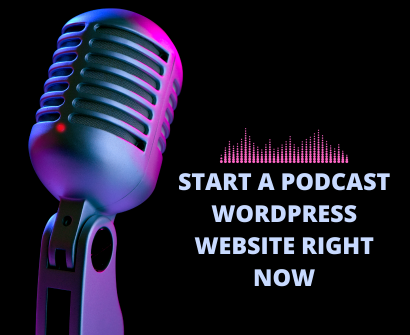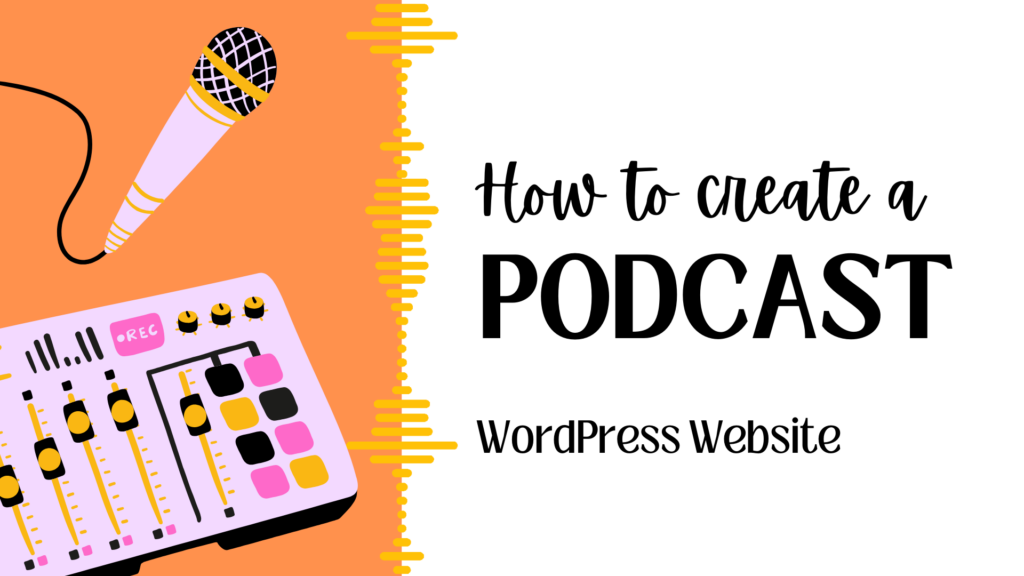

If you’re ready to take your podcast to the next level, this article will walk you through the process of creating a Podcast WordPress website that’s not only functional but also aesthetically appealing. This step-by-step tutorial will help you establish a credible online presence for your podcast, regardless of how experienced or inexperienced you are as a podcaster. Podcasts have become a potent tool for reaching a global audience with ideas, stories, and knowledge.
Podcasts have become a potent tool for reaching a global audience with ideas, stories, and knowledge in the current digital era. Considering how popular podcasts have become, having a separate website just for your podcast isn’t a good idea anymore. Your audience can be expanded, your brand can grow, and you can interact more deeply with your listeners if you have a well-designed and organized podcast WordPress website.
Chapter 1: Planning Your Podcast WordPress Website
It’s essential to have a clear plan in mind before getting too deep into the technical aspects of building a podcast WordPress website. Keep in mind the following elements:
- Define Your Brand: Your website should reflect your podcast’s brand identity. Think about your podcast’s niche, target audience, and overall message. This will influence your website’s design, color scheme, and content.
- Set Your Goals: What do you hope to achieve with your podcast WordPress website? Is it to attract more listeners, monetize your content, or establish yourself as an authority in your field? Define your objectives to guide your website’s development.
- Content Strategy: Plan the type of content you’ll offer on your website. This may include podcast episodes, blog posts, show notes, videos, or other resources related to your podcast WordPress website.
- User Experience: Consider the user experience you want to provide. Ensure that your website is easy to navigate, mobile-friendly, and visually appealing.
Chapter 2: Choosing the Right Hosting and Domain
Selecting the right hosting and domain for your WordPress website is an important decision. Here’s how to make the best choices:
- Web Hosting: Opt for a reliable web hosting provider that offers excellent uptime, customer support, and scalability. Popular options include WP Engine or Virtono.
- Domain Name: Choose a domain name that reflects your podcast’s name or brand. Keep it short, memorable, and easy to spell. You can purchase a domain directly from your hosting provider or through a domain registrar like Virtono.
Chapter 3: Installing WordPress
With your hosting and domain in place, it’s time to install WordPress. Most hosting providers offer one-click WordPress installations. You can follow our Step-by-step guide on How to Start a WordPress Blog. Follow the installation prompts, including choosing your domain and creating an admin username and password.
Chapter 4: Choosing a Podcast-Friendly WordPress Theme
In order to make a good impression, your website’s design is essential. Select a WordPress theme that supports the brand and functionality requirements of your podcast WordPress website. The following features to look for in a theme include:
- Mobile Responsiveness: Ensure that the theme is mobile-friendly to cater to users on various devices.
- Customization Options: A theme with customization options allows you to personalize the design and layout to match your branding.
- Podcast Integration: Some themes come with built-in podcasting features or compatibility with podcasting plugins, making it easier to showcase your episodes.
One of the top WordPress themes for creating a podcast WordPress website is Divi. It provides more than 10 podcast-focused layouts to help you launch your website quickly.
Divi is well known for its extensive customization possibilities. Everything on your website can be customized using the drag-and-drop Divi Builder.
Although it lacks an integrated audio streamer, you can install plugins for audio players like the much more customizable Presto Player plugin.
Chapter 5: Essential Plugins for Your Podcast WordPress Website
WordPress plugins improve the usability of your website. The following plugins are mandatory for your podcast WordPress website:
- Blubrry PowerPress: This plugin makes podcasting a breeze, offering features like audio and video players, podcast SEO tools, and iTunes optimization.
- AIOSEO: Improve your website’s search engine visibility with AIOSEO. Optimize your podcast episodes and other content for SEO to attract more organic traffic.
- Blog Defender: is the most sophisticated, all-encompassing WP site security system on the market right now. It offers defense against EVERY TYPE of hacker, bot, and data miner.
- UpdraftPlus: Backup your website regularly with UpdraftPlus to safeguard your podcast WordPress website content.
- WP Super Cache: Speed up your website’s loading times with caching provided by WP Super Cache.
Chapter 6: Crafting Engaging Content
Creating compelling content is at the heart of a successful podcast website. Here’s how to do it:
- Podcast Episodes: Publish your podcast episodes on your website, complete with show notes, transcripts, and high-quality audio or video.
- Blog Posts: Share relevant blog posts that complement your podcast topics. This can help improve your website’s SEO and engage your audience between episodes.
- Guest Posts and Interviews: Collaborate with other podcasters or experts in your niche to create guest posts and interviews that add value to your audience.
- Visual Content: Use eye-catching visuals, such as images, infographics, and videos, to enhance your content.
Chapter 7: Promoting Your Podcast Website
Your website won’t reach its full potential without effective promotion. Consider the following strategies:
- Social Media: Promote your podcast and website on popular social media platforms like Facebook, Twitter, Instagram, and LinkedIn.
- Email Marketing: Build an email list and send regular newsletters to keep your audience informed about new episodes and blog posts.
- Guest Appearances: Appear as a guest on other podcasts and invite guests to your podcast to expand your reach.
- SEO Optimization: Continuously optimize your content for search engines to increase organic traffic.
Chapter 8: Monetizing Your Podcast Website
If you’re looking to generate income from your podcast website, there are several monetization options:
- Advertising: Partner with relevant advertisers or use ad networks like Google AdSense to display ads on your website.
- Sponsorships: Attract sponsors for your podcast episodes and website content.
- Merchandise: Sell branded merchandise related to your podcast, such as t-shirts, mugs, or stickers.
- Premium Content: Offer exclusive content or early access to episodes to subscribers who pay a fee.
Chapter 9: Engaging with Your Audience
Engaging with your audience is crucial for building a loyal community around your podcast. Here are some tips:
- Comments and Feedback: Encourage listeners to leave comments and provide feedback on your episodes and blog posts.
- Social Media Interaction: Respond to comments and messages on social media promptly.
- Live Q&A Sessions: Host live Q&A sessions with your audience to foster a sense of community.
- Email Communication: Interact with your email subscribers and seek their input on future episode topics.
Summary
Creating a Podcast WordPress website is an exciting endeavor that can significantly enhance your podcasting journey. By carefully planning, choosing the right tools, and consistently providing valuable content, you can build a thriving online presence that attracts listeners and supports your podcasting goals.
As you embark on this journey, remember that building a successful podcast website takes time and effort. Be patient, stay committed to your goals, and continually seek ways to improve and engage with your audience.
